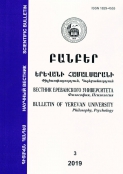THE ETHICAL VIEWS OF GRIGOR TATEVATSI
DOI:
https://doi.org/10.46991/BYSU:E/2019.10.3.003Keywords:
Grigor Tatevatsi, ethics, human, necessity, providence, freedom of will, sin, virtue, salvation, blissful lifeAbstract
Though the ethical views of Saint Grigor Tatevatsi (1346-1409), the most prominent representative of medieval Armenian philosophy and theology, are anchored on the religious paradigm of ''sinfulness-salvation'', the influence of rational ethics is noticeable in them, particularly the demands of reason are also considered to be criterial in the issues of the essence of human being, freedom of will, evil and good, sin and virtue. He consistently defends the idea of free will, criticizing both astrologer-fatalists and necessitarianists, as well as those who condition the free will by predetermination and providence. Tatevatsi, continuing the deeply-rooted tradition in the theological-philosophical thought, excludes the substantive nature of the evil and considers the latter as non-existence or as a lack of good, and as a result of human activity in a social-ethical sense. Tatevatsi presents a complete theory about the meaningfulness of human existence which first of all supposes clear vision of moral meaning of human habitation, i. e. world, of space and time, human dimensions, secondly, of the beginning and end of being, earthly and eternal life, the meaning, purpose of human existence and the ways to reach them. Criticizing the doctrine of ancient thinkers about the blissful being, he denies the probability of blissful existence during earthly life. However, considering the earthly life as a preparation to enter the eternal world (essentially, the problem of salvation and going to heaven or hell is solved during the earthly life), he encourages the human God-pleasing activity, the achievement of virtues and considers the moral lifestyle as the only true way taking us to salvation (God saves those who want to be saved).
Downloads
Published
Issue
Section
License
Copyright (c) 2019 Bulletin of Yerevan University

This work is licensed under a Creative Commons Attribution-NonCommercial 4.0 International License.

